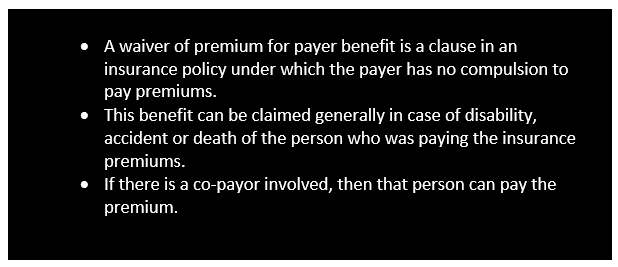Waiver of Premium for Payer Benefit
Updated on 2023-08-29T11:55:47.290702Z
What is a Waiver of Premium for payer benefit?
A waiver of premium for payer benefit is a clause in an insurance policy under which the payer has no compulsion to pay premiums to continue the policy under specific conditions such as disability or death. This benefit can be claimed generally in case of disability, accident or death of the person who was paying the insurance premiums in place of insured due to loss of revenue. In situation that qualifies under the waiver the insurance firm acts as a payer. But, in some situations an extra fee is charged to accomplish the benefit to compensate the extra risks. So, the waiver ensure the policy do not end or become inactive, due to disability or death of the policyholder.
The different parties related to insurance policy includes insured, applicant and payor and the insured is not always payor as the payor is the person deployed by the insured to make premium payments on the insurance policy. If there is a co-payor deployed that the person can pay the premium, but if the insured is not payor they can then deploy a new payor or may pay premium themselves.

Most insurers should consider including cost for a basic waiver of premium for payer rider in their coverage, if not in policy as it is insufficient and to become eligible for the waiver some insurance firm may ask policy holder to meet specific requirements, such as age limit or health requirements.
How waiver of premium for payer benefit works
In case the life insurance policy is purchased by parent or grandparent on behalf of their child, you can’t claim for waivers of premium rider due to death. The firm may offer extended term policy or paid-up policy that is based on the type of policy and cash value. On the other hand, the policy holder may pay premium by themselves or nominate another payor.
However, the waiver can be claimed until the child reached a certain age when they may pay their own insurance premium, such as age 21. The benefit also secures the beneficiaries who may need the financial benefits to pay for college, rent or other living expended when the insured is gone.
In case of death and permanent disability, the benefit generally expires at the age 60 or 65 before the child reaches the age of 25 whichever comes first, and some may also exclude benefits for death by a specified cause. In case the payer becomes disabled, the waiver prevents a policy from lapsing and the rider waiver may also apply specifically to the insured.
Waiver clause and Rider
The waiver allows policyholder to stop paying premiums and still retain the policy, due to disability and the clause in the policy details the definition of disability for insurance firm. So, in case of any disability the insurer needs to notify the insurance firm and keep paying premium until the waiver is in effect. Riders are extra coverage or feature within the insurance policy and as the cost of waiver is quite low, consider adding the benefit if not included in the policy.
Usually, the waiver depends on the insurance policy types. In the term and whole life policies the full amount of premium will be waived of the clause is met but, only cost of insurance charges for the policy is waived in case of variable or universal policy.
Special Considerations
The waiver may come as a clause in the policy or need to be added as a rider and the rider is decided to be added while discussing coverage with insurance agent or completing the application. The waiver of premium rider underwritten same as the disability policy and both the parties need to submit health information if in case the payor and insured are different to know if they are insurable.
However, the insured firm may provide an enhanced waiver of premium for payer rider options, such as to cover unemployment or lay off. Further, a rider can be applied if someone other than insured pays the insurance premium.